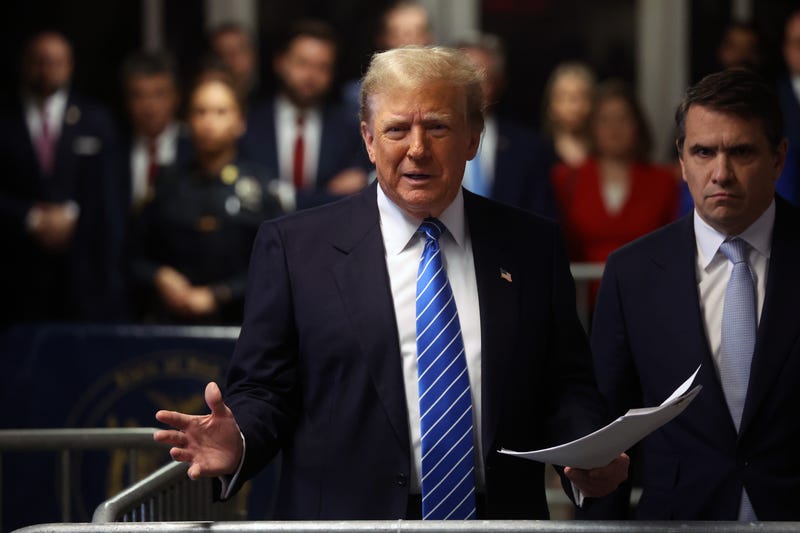
NEW YORK (1010 WINS/WCBS 880) – Michael Cohen, Donald Trump’s former lawyer and personal fixer, testified that the former president approved payments to stifle stories about sex that he feared would harm his 2016 election campaign.
Cohen is by far the most important witness in the case and his appearance signals that the trial is entering its final stretch.
Trump is accused of falsifying internal business records to cover up hush money payments that Cohen made as part of efforts to buy and bury stories that might hurt the former president's 2016 campaign.
4:50 P.M. - Trial adjourned for the day
Cohen will return to the witness stand on Tuesday.
4:40 P.M. - Cohen met with Weisselberg to discuss his reimbursement
As Cohen seethed over his slashed bonus and not being repaid for the $130,000 he shelled out to Stormy Daniels, he said Trump called him and assured him he’d “take care of it.”
Cohen recalled Trump calling him while he was on a holiday vacation in December 2016. He said the then president-elect told him: “Don’t worry about that other thing, I’m going to take care of it when you get back.”
Cohen said he then met with the Trump Organization’s longtime CFO Allen Weisselberg to discuss getting paid back for the Daniels payment.
“I, of course, brought it up to Mr. Weisselberg to ask, ‘When am I getting the money back?’” Cohen testified. “He said, ‘Let’s sit down, let’s meet, let’s do it.’”
Cohen said Weisselberg asked him to provide a copy of the bank statement showing the $130,000 transfer to Daniels’ lawyer.
Cohen said Weisselberg then wrote out various amounts on the statement, including the $130,000 reimbursement, $50,000 for another expense he said he incurred for technology services, plus a $60,000 bonus.
Cohen said Weisselberg suggested he take the money as income rather than a tax-free reimbursement and added additional funds — know as grossing up — to cover his tax bill.
Looking at the note in court Cohen testified, “I recognize his handwriting but I was also in the room when he was writing it.”
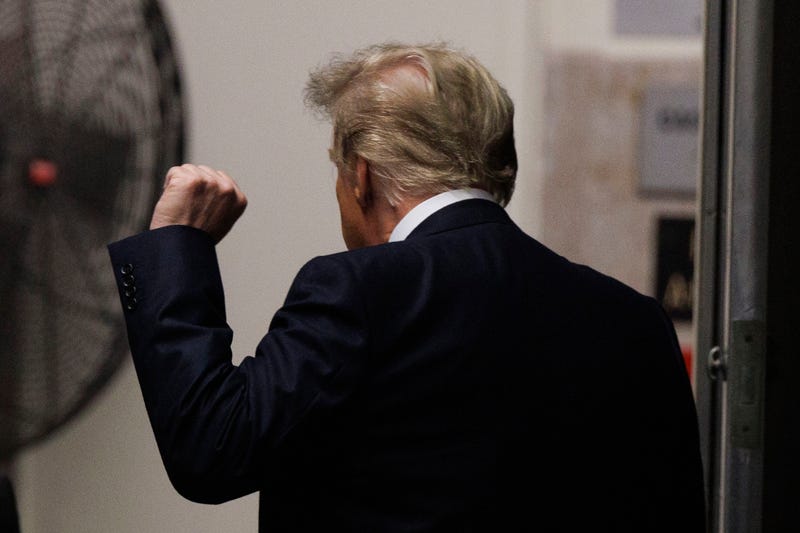
4 P.M. - Trump won election, Cohen lost his job
After Trump won the election, Cohen knew his role as Trump’s personal fixer wasn’t going to last. But given his unique relationship to the president-elect, Cohen figured he might be considered for one of the most prestigious jobs in the White House: chief of staff.
“I just wanted my name to have been included,” Cohen testified, even as he acknowledged he was likely not “competent” enough for the role. “It was more about my ego than anything.”
Instead, Cohen was offered a position as assistant chief counsel, which he turned down.
He then pitched Trump on the role of being his “personal attorney,” compiling a memo on his credentials and bringing in another attorney well-versed in presidential history to highlight the importance of the job.
3:15 P.M. - Michael Cohen signed the 19-page agreement with Stormy Daniels on behalf of David Dennison
3:10 P.M. - Cohen wanted credit for completing his job
On Oct. 27, 2016, less than two weeks before the 2016 election, Cohen finalized the payments to buy Daniels’ story.
Immediately, he went to Trump to inform him the deal was done.
“The task he gave to me was finished, accomplished and done,” Cohen testified, before pointing to a second reason for updating his boss: “to take credit for myself so that he knew I had done it and finished it, because this was important.”
3 P.M. - Cohen’s testimony ties together the prosecutor’s web of evidence
Cohen is testifying to the significance of the many phone logs, text messages and emails that have been shown to jurors throughout the trial.
Among them: a call just after 8 p.m. on Oct. 24, 2016, from Cohen to Trump’s bodyguard, Keith Schiller.
Asked to explain, Cohen testified that he needed to speak with Trump “to discuss the Stormy Daniels matter and the resolution of it” and he knew that Schiller would be with him.
Another call from Cohen to then-Trump Organization CFO Allen Weisselberg was logged in a cell carrier’s records as at 7:25 p.m. on Oct. 25, 2016. Cohen said that call also “had to do with the Stormy Daniels matter.”
Asked by a prosecutor if there was any urgency, given that the call happened after normal business hours, Cohen responded: “significant urgency.”
That same day, a prosecutor noted, Cohen had a flurry of calls with then-National Enquirer publisher David Pecker on the encrypted messaging app Signal.
Cohen said he was speaking with Pecker about the Daniels deal — and even made a failed, last-ditch effort to get the publisher to foot the hush-money bill. As for the volume of calls, Cohen explained: “Signal is terrible with keeping phone calls. They drop all the time.”
Two days later, Cohen made the hush money payment through the bank account of the company he created, wiring $130,000 to Daniels’ lawyer, Keith Davidson.
Cohen said that before he went to First Republic Bank to open up the account that would be used to pay Daniels, he had one last conversation with Trump in which he informed the candidate of what he was doing.
“Everything required Mr. Trump’s sign off,” Cohen testified, adding that. “On top of that, I wanted the money back.”
2:40 P.M. - Cohen admits to misleading the bank
Cohen said he knew that he’d have to mask the true purpose of the bank account that he opened to pay the money to Stormy Daniels.
“I’m not sure they would’ve opened it,” he continued, “if it stated: to pay off an adult film star for a nondisclosure agreement.”
Indeed, earlier in the trial, an employee at First Republic Bank testified that they had specific rules about becoming involved with people in certain industries, including porn.
So, Cohen initially said his account was for a new limited liability corporation called Resolution Consultants. But then, Cohen said, “It dawned on me. It’s the name of the company of someone I know.”
Soon after, Cohen changed the name of the account to Essential Consultants.
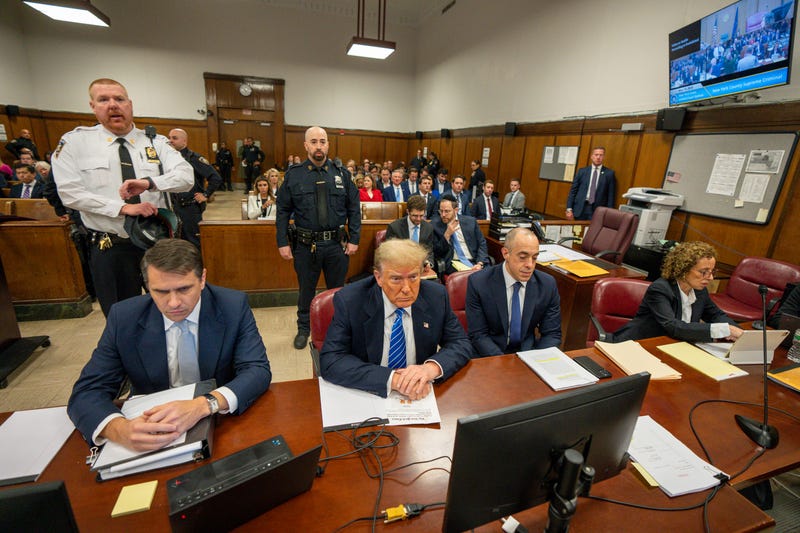
2:10 P.M. - Cohen's testimony resumes: Trump’s desire to delay paying Daniels put him at risk of ‘losing control of the story’
Cohen describes the efforts to delay payment, but Stormy Daniels declared the deal off on Oct. 17, and her attorney, Keith Davidson, indicated he was no longer representing her. Cohen attempted to contact Trump as the story was potentially leaking to the Daily Mail, leaving him a voicemail. He testified, "We were losing control of the deal."
Cohen implicates Trump in discussions about paying Daniels, recounting their conversation: "He stated to me—he had spoken to some friends, smart people, who told him, 'It's $130K, just pay it, no reason to keep this thing out there so do it.' He expressed to me, 'Just do it, go meet up with Allen Weisselberg and figure this whole thing out.'"
When asked if he had a conversation with Weisselberg, Cohen confirmed, discussing the need to fund the account: "I had the account now it needed to be funded. Can we get AMI to pay it? No. AW says we need to figure out how to fund it. Options—if I knew anybody to purchase a golf membership, I said obviously not a possibility, each entity has a Trump name attached to it. He asked about AW funding it."
Cohen continued, pressing Weisselberg: "Ask Weisselberg—You're the CFO, why don't you pay—you'll get it back, not worrying about that one." Weisselberg replied, "I'm not in a financial position to do it—four grandkids at prep schools, paying for camp, can't do it."
Given the urgency and the looming threat of the story going to the Daily Mail, Cohen decided: "Because of the urgency that was happening—and they were heading to Daily Mail, I said OK, I'll pay."
On the topic of repayment, Trump assured Cohen, "Don't worry about it, I'll make sure you get paid back."
Cohen and Weisselberg then spoke to Mr. Trump, who was appreciative: "Good, good," Trump responded. "Don't worry, you'll get the money back."
Cohen commented on his actions: "I was doing everything I could and more in order to protect my boss, something I'd done for a long time. I would not lay out $130K for an NDA needed by somebody else."
1 P.M. - Cohen recounted informing Trump about Stormy Daniels wanting a deal
"He was extremely angry with me—'I thought you had this under control. Just take care of it. A lot going on.' He said, 'This is a disaster, a total disaster. Women will hate me—guys may think it's cool, but this is going to be a disaster for the campaign.' Mr. Trump was polling very poorly with women. He said, 'This is a disaster, deal with it.'"
During this period, Trump handed a note to his attorney, Todd Blanche, giving it to him personally.
Cohen described Trump's strategy regarding the timing of the deal: "Push it out—past the election because if I win, I'll be President and if I lose, I don't really care."
Reflecting further on Trump's priorities, Cohen noted, "I said, 'And how are things gonna go upstairs?' He wasn’t thinking about Melania. It was all about the campaign. He said, 'Don’t worry. She goes, 'How long do you think I’ll be on the market for? Not long.'"
12:45 P.M. - Trump wanted Cohen to ‘get control over’ the ‘Access Hollywood’ tape
Cohen said he became aware of the “Access Hollywood” tape after the campaign was contacted for comment by a Washington Post reporter.
He said he immediately reached out to Steve Bannon, who was then a senior campaign official, to see how they were handling things.
“I wanted to ensure that things were properly being taken care of to protect Mr. Trump,” Cohen testified.
He said he later spoke with Trump, who advised him to try to “get control over the story” and “minimize its impact.” According to Cohen, Trump wanted him to cast the story as “locker room talk” — a term he suggested might have been recommended by former first lady Melania Trump.
On Oct. 8, 2016, Cohen had two conversations with Trump while Cohen was in London, coinciding with the release of the Access Hollywood tape.
Question: "What did you discuss with Trump?"
Cohen: "He wanted me to reach out to all my contacts in the media. We needed to put a spin on this—that this is locker room talk, something that Melania had recommended—at least that's what he told me. Use that in order to get control over the story to minimize its impact on him and the campaign."
12:10 P.M. - Cohen testifies secret recording is real and unaltered
In response to two questions by the prosecutor, Cohen affirmed that the recording he’d secretly made of Trump was not altered and sounded exactly the same as the day it was recorded. The questions were meant to elicit a response to an argument previously raised by the defense, accusing Cohen of altering the tape.
Earlier in the trial, Trump’s attorneys pressed a technical witness about the “gaps” in the handling of the phone after Cohen made the recording, along with the abrupt cut-off at the end of the tape — which Cohen said was the result of an incoming call from a bank official.
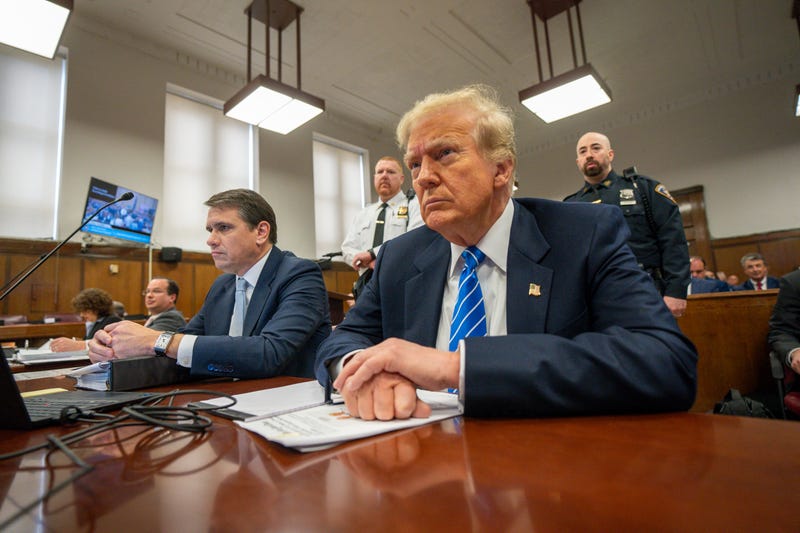
11:10 A.M. - Cohen’s recorded conversation with Trump
The court session featured a previously public recording capturing a financial discussion between Donald Trump and Michael Cohen. Cohen testified that the recorded conversation played in court was the only one he had ever made between him and Trump.
In this recording, Cohen can be heard arranging logistics for a payment:
Cohen said he made the recording “so I could show it to David Pecker and that way he would hear the conversation and he would know that we’re going to be paying him back, that Mr. Trump was going to be paying him back.”
Cohen: "I talked to Allen to set the whole thing up, funding, when it comes time for the financing..."
Trump, unclear about the reference to finances, questions Cohen:
Trump: "What financing?"
During the courtroom questioning, Cohen clarified his choice of words:
Question: "You mentioned financing."
Cohen: "It was not the best usage of the word. I meant funding, not financing. I meant how much needed to be paid."
Further probing revealed the nature of the payment discussions:
Question: "What did you understand him to mean, pay in cash?"
Cohen: "To pay in green, obviously one way to avoid a paper transaction. But that's not what I thought was the best way to do it..."
Question: "That's why you said no?"
Cohen: "Yes..."
Cohen testified that the recording abruptly cut off because he was receiving an incoming call to his phone, a claim substantiated by cell phone carrier records shown in court. Referencing his contact list, Cohen said the number listed in the carrier records belonged to a bank official who was trying to get ahold of him.
Cohen testified Monday that he didn’t feel he needed to record any more of the conversation, anyway.
“I didn’t want to record more,” Cohen testified. “I already had enough to show David Pecker as to convince him that he was going to receive the $150,000 back.”
Cohen testified that after the recording cut off, he told Trump that he was going to go to Weisselberg’s office to discuss the plan further and that he would get back to Trump with an update.
11 A.M. - Cohen gets rid of Trump’s alleged affair with Playboy model Karen McDougal story
By June 2016, Cohen learned from AMI that former Playboy model Karen McDougal was shopping around her story. Cohen recounted going into Trump’s office urgently: "Boss, I gotta talk to you—I talked about what I just learned."
When he asked Trump if he knew who Karen McDougal was and about the story being shopped, Trump's response was, "She's really beautiful." Cohen tried to emphasize the seriousness of the story being shopped, but when asked to interpret Trump's response, an objection by the judge was sustained, leaving that line of questioning unresolved.
Question: Pecker told you it was bulletproof?
Cohen: "Yes, it prevented the story from appearing on ABC News. Effectively, the story has now been caught."
Trump's reaction after the agreement was signed: "Fantastic, great job," Trump commended.
Cohen also mentioned he knew Keith Davidson since 2011 and Stormy Daniels. He regularly communicated with David Pecker and Dylan Howard at the National Enquirer to prevent the story from leaking. The tabloid executives frequently updated him, and he kept Trump informed of the developments.
Cohen believed the publication of the story would have had a "significant" impact on Trump’s presidential campaign.
After the National Enquirer shelled out $150,000 to suppress McDougal’s story about Trump, Cohen testified that the tabloid’s publisher was hounding him to get Trump to reimburse him for the cost.
“It was too much money for him to hide from the CEO of the parent company” and he’d already laid out $30,000 for the doorman story, Cohen testified. He recounted meeting Pecker at his favorite Italian restaurant and the publisher being upset about not being repaid.
10:45 A.M. - The doorman story purchase
Cohen provided details on how a story about a Trump love child allegation was purchased by AMI. He testified that the story, involving a doorman, was secured through an agreement executed in December 2015, showcasing efforts to control potentially damaging narratives.
Cohen testified about his role in brokering a deal to buy a potentially damaging story from a Trump Tower doorman, Dino Sajudin, in order “to take it off the market.” It’s a story jurors have heard already from prior witnesses — but Cohen is speaking directly about Trump’s role in the catch-and-kill scheme.
Cohen said he went to Trump immediately after learning about the story — which claimed, falsely, that Trump had a child out of wedlock. In reply, Trump told him, “You handle it,” according to Cohen.
Cohen then worked with the National Enquirer’s David Pecker and Dylan Howard to pay Sajudin $30,000 for the story. Cohen said he suggested the $1 million penalty for the doorman if he broke terms.
10:40 A.M. - Cohen warned Trump that negative stories might follow his presidential bid announcement
Cohen testified about a conversation he had with Donald Trump prior to Trump's announcement to run for president. Cohen warned, "You know when this comes out, there will be a lot of women coming forward." This set the stage for a series of disclosures related to how potential negative stories were handled.
In January 2016, discussions with American Media Inc. (AMI) focused on repackaging certain stories. Cohen testified that he reviewed the content and specifically advised, "Take out the part of the Penthouse Pet Sandra as it offers nothing," emphasizing strategic management of sensitive information.
10:30 A.M. - The 2015 Trump Tower meeting with David Pecker
Michael Cohen shared insights into his communications with David Pecker, former publisher of the National Enquirer, stating they would use the encrypted messaging app Signal "depending on the matter" to keep their discussions untraceable. This method of communication was deemed beneficial for sensitive topics.
During an August 2015 meeting at Trump Tower, Pecker, according to Cohen, proposed to act as the "eyes and eyes" of the campaign, aiming to intercept negative stories before they could be published. Pecker testified that he offered to publish positive stories about Trump and to keep an eye out for any negative information, attempting to prevent such stories from emerging.
Cohen cited specific negative stories that Pecker sought to manage, including rumors about Hillary Clinton's health, a controversial photo involving Ted Cruz's father, and allegations of Marco Rubio's involvement in illicit activities.
Further, Cohen testified that he would show Trump covers of the National Enquirer, which Pecker sent over, as evidence of Pecker's reliability and to illustrate the potential media influence they could wield. Trump reportedly reacted to these stories with enthusiasm, remarking, “It’s fantastic, it’s unbelievable.”
Cohen aimed to leverage the National Enquirer's high visibility, particularly its placement near supermarket cash registers nationwide, to benefit Trump's campaign. He also warned Trump about the potential for negative stories following his presidential bid announcement. Cohen recalls telling Trump that many women might come forward once he announced his candidacy.
10 A.M. - Cohen kept Trump’s contacts on his own cell phone
In order to get people on the phone for his old boss quickly, Cohen said Trump’s contact list was incorporated into his own list on the two cell phones he turned over to prosecutors during the investigation that led to Trump’s indictment.
Cohen testified that Trump wanted his contacts on Cohen’s phone because they spent a considerable amount of time together and he’d say, “Michael, get me so and so on the line.”
One of Cohen’s phones had more than 30,000 contacts, according to trial testimony.
Cohen gave prosecutors the phones, which he’d used through 2018, so that they could preserve evidence related to the Daniels payment.
That included voice recordings of conversations he had with Keith Davidson, a lawyer for Daniels, as well as emails and text messages.
9:45 A.M. - Michael Cohen takes the stand
As Michael Cohen rose from the witness stand, dressed in a blue and white tie, he began describing his initial encounters with Donald Trump. Cohen had an apartment in one of the Trump buildings where a family member also resided. After handling a challenge with the board in a manner that Trump admired, Trump expressed his desire for Cohen to work for him.
Cohen recounted an early professional interaction over a substantial billing matter: "I was asked to review a series of documents dealing with Trump Entertainment Resorts. The bill was approximately $100,000. I was asked to meet with Trump at the office, which I did. I asked him about the bill. He inquired if I was happy with my CEO firm, then asked, 'Do you want to come work for me?' I was honored, surprised." Trump humorously warned, "He asked me if I wanted to get fired on the first day—if I asked about the bill." When asked if the bill was ever paid, Cohen's answer was straightforward: "No."
Their discussion turned to salary negotiations, concluding at a $375,000 annual salary with bonuses to be discussed later. Cohen added, "I never went back to my former firm, not even that day. He gave me Ivanka's old office on the 26th floor."
Asked if Trump ever instructed him to renegotiate bills, Cohen affirmed, "Yes. A law firm sent an invoice. Trump didn’t believe the invoice was fair, reasonable, or justified, and gave me the task of renegotiating the bill."
Cohen also detailed his involvement in the Trump University financial troubles: "Trump University fell into trouble with approximately 50 vendors who had not been paid, with only $2 million in the bank and bills far exceeding this amount. Trump wasn’t going to fund the balance. I put it on a handwritten spreadsheet, divided by $2 million, basically came up with 20 percent of everyone's invoice. All but two accepted the 20%, releases were drafted, then checks sent by FedEx."
When asked about the fate of the two vendors who did not accept the offer, Cohen simply stated, "They went away."
Reflecting on his work with Trump, Cohen described it as "fantastic" when acknowledged by Trump, making him feel "like I was on top of the world." Despite the challenges, Cohen described his decade with Trump as "an amazing experience in many ways. There were great times, several less-than-great times, but for the most part, I enjoyed the experiences, enjoyed my colleagues, the Trump children - it was a big family."
Regarding his role as a fixer, Cohen admitted, "I did [lie for him]—it's what was needed to accomplish the task." He accepted the 'fixer' label, noting, "It's fair."
9:30 A.M. - Trump enters courthouse
Trump entered the courtroom wearing a blue and white striped tie, accompanied by his son Eric, Representative Nicole Malliotakis, Senator JD Vance, and attorney Alina Habba, who has been present for the last few days. Several other individuals were also with him, filling two full rows.
The judge was already on the bench—see the pool information below for more details on identifying other people present.
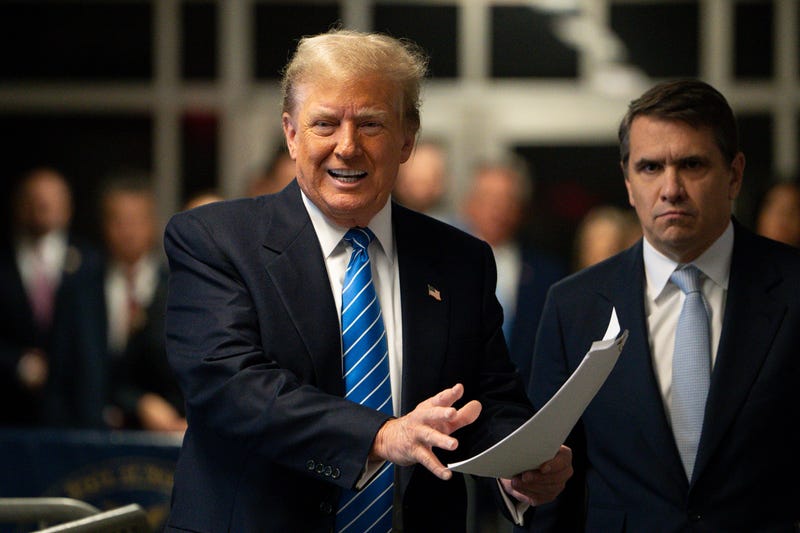
Trump addressed the media for about six minutes in the usual area enclosed by waist-high metal barricades. His attorney, Todd Blanche, stood by his side as Trump criticized several press articles, claiming they demonstrate the flaws in the case against him.
In the back of the hallway stood JD Vance, Nicole Malliotakis, and Tommy Tuberville. While Trump spoke, Vance and Tuberville shared a moment of laughter.
The judge has decided not to allow the severance agreement for Weisselberg.
9 A.M.- Observations from the courthouse
Representative Nicole Malliotakis is apparently accompanying Trump today, according to a hallway pool reporter. I wouldn't be surprised if more of his allies join him. Last week, Jeannine Pirro attended the proceedings for two consecutive days, and both Trump's son Eric and Greg Kelly from Newsmax were present.
Outside, there were some demonstrators supporting Trump.
Given Michael Cohen's anticipated testimony today, Trump might be expecting a larger show of support. Additionally, the line for the overflow courtroom was unusually long at 7:15 this morning. While many in line are press, there are also members of the public queueing up. Currently, there are about five members of the public in the main courtroom.
The Associated Press contributed to this report.
